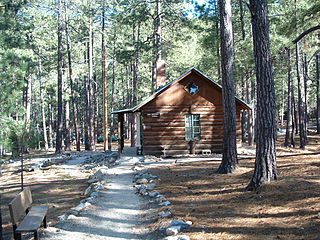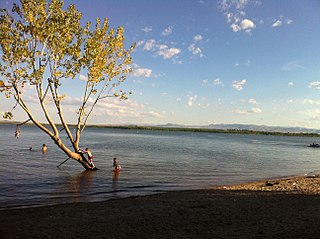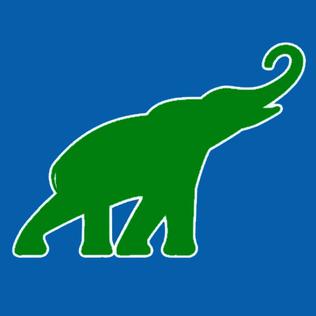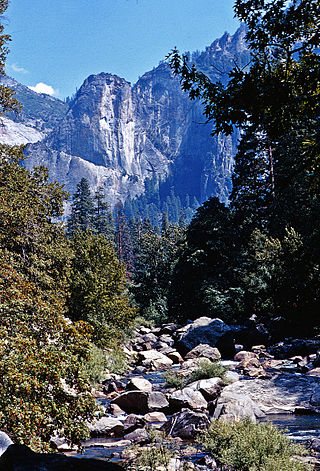
The organized environmental movement is represented by a wide range of non-governmental organizations or NGOs that seek to address environmental issues in the United States. They operate on local, national, and international scales. Environmental NGOs vary widely in political views and in the ways they seek to influence the environmental policy of the United States and other governments.

Theodore Roosevelt Jr., often referred to as Teddy or by his initials, T. R., was an American politician, statesman, soldier, conservationist, naturalist, historian, and writer who served as the 26th president of the United States from 1901 to 1909. He previously served as the 25th vice president under President William McKinley from March to September 1901 and as the 33rd governor of New York from 1899 to 1900. Assuming the presidency after McKinley's assassination, Roosevelt emerged as a leader of the Republican Party and became a driving force for anti-trust and Progressive policies.
The conservation movement, also known as nature conservation, is a political, environmental, and social movement that seeks to manage and protect natural resources, including animal, fungus, and plant species as well as their habitat for the future. Conservationists are concerned with leaving the environment in a better state than the condition they found it in. Evidence-based conservation seeks to use high quality scientific evidence to make conservation efforts more effective.

Scouting in Arizona has a long history, from the 1910s to the present day, serving thousands of youth in programs that suit the environment in which they live.

The National Audubon Society is an American non-profit environmental organization dedicated to conservation of birds and their habitats. Located in the United States and incorporated in 1905, Audubon is one of the oldest of such organizations in the world. There are completely independent Audubon Societies in the United States, which were founded several years earlier such as the Massachusetts Audubon Society, Indiana Audubon Society, and Connecticut Audubon Society.

Theodore Roosevelt National Park is an American national park of the badlands in western North Dakota comprising three geographically separated areas. Honoring U.S. President Theodore Roosevelt, it is the only American national park named directly after a single person.

The Antiquities Act of 1906, is an act that was passed by the United States Congress and signed into law by Theodore Roosevelt on June 8, 1906. This law gives the president of the United States the authority to, by presidential proclamation, create national monuments from federal lands to protect significant natural, cultural, or scientific features. The Act has been used more than a hundred times since its enactment.

William Temple Hornaday, Sc.D. was an American zoologist, conservationist, taxidermist, and author. He served as the first director of the New York Zoological Park, known today as the Bronx Zoo, and he was a pioneer in the early wildlife conservation movement in the United States.

The Boone and Crockett Club is an American nonprofit organization that advocates fair chase hunting in support of habitat conservation. The club is North America's oldest wildlife and habitat conservation organization, founded in the United States in 1887 by Theodore Roosevelt and George Bird Grinell. The club was named in honor of hunter-heroes of the day, Daniel Boone and Davy Crockett, whom the club's founders viewed as pioneering men who hunted extensively while opening the American frontier, but realized the consequences of overharvesting game. In addition to authoring a famous "fair chase" statement of hunter ethics, the club worked for the expansion and protection of Yellowstone National Park and the establishment of American conservation in general. The Club and its members were also responsible for the elimination of commercial market hunting, creation of the National Park and National Forest Services, National Wildlife Refuge system, wildlife reserves, and funding for conservation, all under the umbrella of what is known today as the North American Model of Wildlife Conservation.

The Deer Flat National Wildlife Refuge is an important breeding area for mammals, birds, and other animals. The National Wildlife Refuge is located on land surrounding Lake Lowell, just outside Nampa, Idaho. It serves as a resting and wintering area for birds, including mallards and Canada geese, along the Pacific Flyway and was named a "Globally Important Bird Area" by the American Bird Conservancy.

Russell Errol Train was the second administrator of the Environmental Protection Agency (EPA), from September 1973 to January 1977 and the founder chairman emeritus of World Wildlife Fund (WWF). As the second head of the EPA under Presidents Richard Nixon and Gerald Ford, Train helped place the issue of the environment on the presidential and national agenda in the late 1960s and early 1970s, a key period in the environmental movement. He was a conservative who reached out to the business community and Republicans. He promulgated the idea that as the economy of the nation was growing quickly, public as well as private projects should consider and evaluate the environmental impacts of their actions.

ConservAmerica, formerly known as Republicans for Environmental Protection (REP), is a national nonprofit organization formed in 1995. REP's stated purpose is to strengthen the Republican Party's stance on environmental issues and support efforts to conserve natural resources and protect human and environmental health. Incorporated in Illinois, its headquarters are in Sturgis, Michigan.

Maurice K. Goddard was the driving force behind the creation of 45 Pennsylvania state parks during his 24 years as a cabinet officer for six governors of the Commonwealth of Pennsylvania.

Conservation in the United States can be traced back to the 19th century with the formation of the first National Park. Conservation generally refers to the act of consciously and efficiently using land and/or its natural resources. This can be in the form of setting aside tracts of land for protection from hunting or urban development, or it can take the form of using less resources such as metal, water, or coal. Usually, this process of conservation occurs through or after legislation on local or national levels is passed.

The Maltese Cross Cabin is a cabin used by Theodore Roosevelt, before he was President. The cabin is currently located at the visitor center at Theodore Roosevelt National Park, just outside the town of Medora, North Dakota.

The Elkhorn Ranch was established by Theodore Roosevelt on the banks of the Little Missouri River 35 miles north of Medora, North Dakota in the summer of 1884. Roosevelt hired Bill Sewall and Wilmot Dow, two Maine woodsmen, to run the ranch. Sewall and Dow built the ranch house, "a long, low house of logs," in the winter of 1884–1885.
George Fuller Miller Sr. was a long-time Boy Scouts of America executive, the recipient of the Distinguished Eagle Scout Award and a founding father of the American Humanics Foundation.

Roosevelt Republican is a term used in discussions about politics of the United States to describe individuals with beliefs reminiscent of American President Theodore Roosevelt, a politician who spent much of his career as a Republican. Roosevelt possessed diverse political positions and social views, but this label has been generally deployed by figures who wish to publicly align themselves with Roosevelt's record of nature conservation. In particular, defending historic wildlife and undertaking related efforts to preserve environments seen as a part of classic Americana receives emphasis. This mindset broadly contrasts with the ideologies of ethnic nationalism and religious nationalism through identity politics coupled with wholesale economic development without protections for nature advocated for by the Republican mainstream of the 2010s and 2020s, though more centrist and center-left thinking significantly influenced the party in prior decades.















